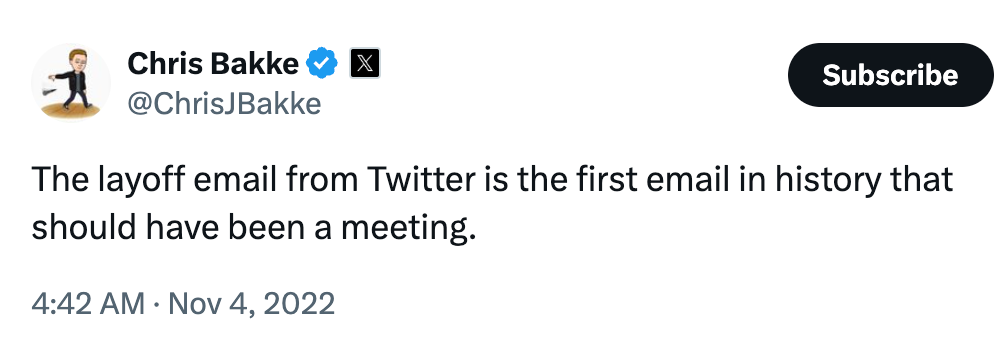More office time is the cost of bureaucracy
ALSO: how to purge your company of meetings & lots more
Over the last few months the drumbeat of stories of CEOs demanding more and more office time has been unrelenting. Just when you thought we were past all this, the news keeps coming.
Earlier this month thousands of employees at SAP signed a letter saying they felt ‘betrayed’ by the firm’s new ‘3 days in’ policy starting in April. The company’s CEO, Christian Klein had previously boasted that SAP was a ‘100 percent flexible and trust-based workplace’.
The BBC reported on the ‘executive hubris’ of bosses of big firms like Boeing, JP Morgan Chase, Goldman Sachs and Citigroup demanding a five-day office return reflecting that it was a consequence of ‘hard-line management tactics’ triumphing over the idea of empowering employees.
Such has been the torrent of stories that it’s invited me to rethink whether my own reading of the research is wrong. I paused to think and wonder if there was a reason why bigger firms are still feeling that hybrid working is failing their organisations.
The issue of this being relevant only to bigger firms is an important point. Small teams and smaller organisations rarely report issues to me when we have discussions about remote working.
A reminder of what the research says:
Research says hybrid working reduces employee attrition & increases job satisfaction (see next article)
BCG reports that structured hybrid firms are growing at twice the speed of in office organisations
Structured hybrid working (agreed shared days in the office) scores the highest for employee satisfaction in Glassdoor ratings (2023)
When I work with the leadership teams of organisations of 40-60 people they tell me how hybrid working has motivated their teams and aided employee retention. I’ve even worked with small teams inside huge organisations and theyve told me a couple of days in the office proves enough to re-energise and connect with each other and the wider group.
But big firms sigh and tell me they’re struggling with employee engagement, that the culture doesn’t feel the same and that they’re going to demand stricter attendance rules.
So why the difference? It’s worth reminding ourselves of why big is different. You may have seen these maps of connections between team members (sometimes called dependencies).
When a team has three people in it there are three dependencies. A needs to know B and C, C needs to know B - three lines of communication. When a fourth person is added the number of dependencies doubles to 6. A fourth person takes it to 10. With 6 people there are 15 dependencies.
As teams get bigger and bigger the lines of communication rise exponentially.
By the time a team reaches 14 people there are 91 lines of communication. Anyone who has worked in a big organisation will recognise managers telling them they can’t just be good at their job, they also need to be a better communicator. In big firms there’s a lot of people to keep in the loop at any stage - internal PR is a big component of a job.
This has always been the challenge of big firms. Netflix used to proudly articulate the challenge of scale was a trade off with employee autonomy. Here’s a slide from their OG culture deck.
Netflix boast (at the time) was that they empowered their workers to avoid that bureaucracy.
But many big firms are trapped in the loop of feeling like relationships and connections are missing from remote working. There are so many connections to sustain that paradoxically work becomes more impersonal and disconnected. The illusory indulgence of opening the door to the corner office and walking the floor seems to be lack the magic it once had.
As regressive as some of the RTO moves by big firms feel they do reflect a growing concern amongst some monster organisations that colleagues are more detached when working remotely. I chatted to someone this week who told me ‘no one ever answers my pings on Mondays and Fridays’. At SAP CEO Christian Klein justified his decision, ‘I’m not a big believer that on [Microsoft Teams] you can understand our culture, you can get educated, and you can get enabled to do your job best’.
Maybe, just maybe he’s right. For big firms who don’t intentionally design new ways of working then maybe they do need more days in the office. It’s largely an admission that they’ve not planned how they are working, that they’ve not adapted with the times and they’ve found that by trying to work in the way they used to work it fails big bureaucracies.
Sure get everyone back in the office. I’m not sure what it says about these companies capacity to reinvent for bigger challenges in the years ahead. But maybe bureaucracies really do need to be in the office for most of the week.
Hybrid work, happy workers
I saw Nick Bloom, researching professor and Patron Saint of Hybrid Working, talking on a webinar last week. He cited a paper that he’d worked on that studied the impact of hybrid working on employee experience.
Switching to hybrid working had had a big effect on employee attrition (quit rates) reducing them by a third. But it had the opposite effect on managers suggesting that managers found it harder to manage remote workers - the quit rate amongst managers rose by 55%. Managers just didn’t enjoy managing absent workers.
Not only did employee attrition fall but job satisfaction rose substantially including job recommendation, work satisfaction, life satisfaction and work-life balance.
Some compelling details about meeting purges
Microsoft data says that hybrid workers are spending 50% of their week in meetings.
So how could we reduce this time? The experience of Asana and Shopify is worth exploring in detail.
At Asana they were asked to identity meetings that lacked value. They were told to remove standing meetings with fewer than five people for a 2 day experiment
Result: most meetings shrunk in length down to 15 minutes. Some weekly meetings became monthly. There was an average saving of 11 hours a month.
The firm also introduced a 'No Meeting Wednesday'.
They also introduced a simple tool - to measure meetings via two axes: the impact of the meeting (out of 3) and the effort taken with prep and follow-up (again out of 3). Meetings that were a lot of work but had little impact were also eliminated by teams.
Slack also has a no meeting 'Focus Friday' and Maker Weeks when all meetings are cancelled to get projects done. These weeklong hiatuses serve as a provocation: ;This break in regularly scheduled meetings encourages teams to reevaluate their calendars and ask, did we really need that meeting at all?'
Loved this article detailing these changes - have you tried anything similar?
Further listening: the FT Working It podcast had a brilliant episode on these intiatives at Slack
Should we have to trade off pay for happiness? Not in my opinion but it’s complicated. I chatted to Helen Coffee at The Independent about it
86% of working parents want to progress their careers but only 30% believe that is possible with their current employer. How should firms think about attracting and retaining working parents? Leader Plus is an organisation that supports getting working parents into leadership roles
I normally wince when I read a newly made up jargon word, but this piece about humourbragging, is really just about bringing warmth to our communications
Hybrid = less pay, lower job security. Job cuts are disproportionately impacting remote workers - those based at home for 5 days a week were 35% more likely to be laid off in 2023 - ‘when a manager gets news they need to cut staff, it’s easier to put someone on the list that you don’t have a relationship with’. Further research by the Financial Times says that home workers have had slower wage growth than office loiterers
I enjoyed Zoe Schiffer’s book about Elon Musk’s inability to run a social network (or exhibit any integrity at all really). This tweet was a highlight of it:
Young people are understanding the value of sleep better than ever before. In 2022 twentysomethings reported getting an average of 9.5 hours sleep a night - a 10% improvement over numbers from a decade before. Nice article on how 9pm is becoming the hottest new bedtime
Do bonuses actually make us work harder?
Many of us have worked in environments that provided bonuses for success. Maybe they took the form of team rewards or individual incentives, or end of year profit-share schemes. But do these rewards achieve what they are designed to?
Professor Uri Gneezy is the world's foremost expert on the science of incentives - and he comes with a huge warning about what such schemes actually achieve.
Eat Sleep Work Repeat is today hosted by Bruce Daisley, Ellen Scott and Matthew Cook.








Great piece on bonuses. Great to hear self determination theory get a mention too. To often firms try and buy their way out of giving autonomy,feeling of progression and purpose through retention payments.
The return to work is an interesting debate and I'm saddened by the exponential rise of regressive managemt practices that demonstrate a lack of trust and an infered presenteeism that doesn't feel future focussed at all. The approach seems to be hankering back to the building of physical empires and the re-inflation of egos deflated through COVID.
I have a hybrid team and it works very well.